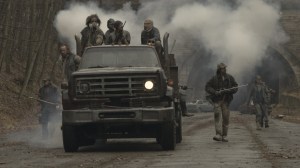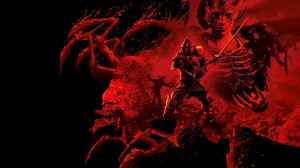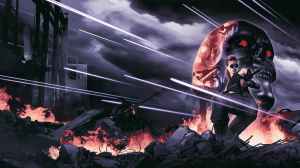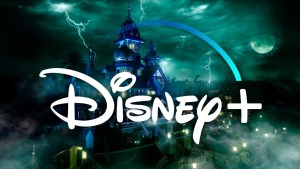The internet gives anyone with access to it a direct pathway to an incalculable amount of information, though not all of that information is objectively correct. What one person deems to be reliable information, others might dispute if such claims don’t align with their worldview. In this regard, conspiracy theorists have grown to surprisingly large numbers in recent years, all while gaining more notoriety with every conspiracy they “expose.” In director April Mullen’s new film Wander, a conspiracy theorist takes center stage, yet the ramifications of the conspiracies he uncovers would bring with them shocking reveals about his own past.
Videos by ComicBook.com
In the film, after getting hired to probe a suspicious death in the small town of Wander, a mentally unstable private investigator becomes convinced the case is linked to the same “conspiracy cover up” that caused the death of his daughter.
ComicBook.com caught up with Mullen to talk about her approach to the film, injecting personal perspectives, and cast contributions.

ComicBook.com: How did you first get involved in Wander, what was your first exposure to it? Also, once you got involved, did the script go through many changes?
April Mullen: I will start with the beginning. A long-time producing partner, best friend, and collaborator of mine, Tim Doiron, he normally writes and I direct, and we produce together. We’ve done about, gosh, six films together. We came together as we always do and brainstorm on what project we want to make next, and what do we want to say with where we’re at in our careers, and what kind of film do we want to make? We always love to do something new, completely out of our comfort zone, and really challenge ourselves as filmmakers, writer/director team.
At the time, Tim was going through this mental health issue, dealing with paranoia, anxiety, conspiracy theories of government surveillance, and are we being watched and is Big Brother all around us, and dealing with technology. He had these little signs all over his apartment, like, “I am protected. I am powerful.” I just thought that that was such an honest and beautiful beginning place for a character. It was really vulnerable and raw for him. I just thought, “What if that was our lead character, as the backdrop of our hero, this silent warrior who’s absolutely petrified and frozen and full of anxiety, bumped up against fear and his worst fear is coming to life. How could we make that our hero, and incorporate that as our lead?”
Then we came up with the backdrop of the conspiracy theory, like what if a conspiracy theory was what happened, or what he believes happened to an accident where it cost him his family and his daughter’s life, and what happened if that hero then had to face his biggest nightmare, that conspiracies do exist. And not only that, did he discover the one that caused the accident, and would he persevere? Would he cut through all of this and make it to the end and shed light on what was happening in the town of Wander, or would he be too paralyzed by fear and his underlying issues that he would crumble and not be able to then avenge his daughter’s death? It came from a place of truth.
And did it change? Immensely. At first, it was even more of a rabbit hole of a film. It was very much obsession over the unreliable narrator and really everything you saw was from Arthur’s perspective. There wasn’t a character or a scene or a moment outside of first-person perspective. Then we thought, “Whoa, that’s way too far,” and our agents and managers also thought the same. They were like, “Other people have to exist. Other plotlines have to exist.” And so we brought in the world and it wasn’t just inside Arthur’s head, but we still wanted to keep that, so through editing, and through the way it was shot, we still tried to keep it at first-person storytelling. Like, is this actually happening with Arthur or is this all happening in his mind? And keep that beautiful melding between reality and his imagination, still have that tangible throughout the film, because that was the original concept.
Well I wondered, if the story was potentially focusing on the conspiracy angle, it could have unfolded anywhere in the country, but the incorporation of experiments being done on Native Americans and people of color and the disenfranchised required it to be told in the American Southwest. Were those themes also always there from the beginning?
It came in, again, very early on. When we were doing our research about — this gets very dark, very fast — human testing and government testing on humans. We were doing research on what was real and what happened in our history and, whether it be a conspiracy or the reality behind MKUltra, Illuminati, all of those types of things, and it became very apparent to us, because usually the subject matter or victims of those types of conspiracies were people of color and indigenous people, that that’s part of our story. We never wanted it to be heavy-handed in any way, but it definitely also, too, was from a place of truth. We really did pull from history books there. Some might believe it’s conspiracy, some might believe it’s truth, but what we read, we really believe it was true and is true and still is happening today.
Whether it be chip technology for border control … that, we sort of made up on our own, because I think we’re not far away from chip technology. I think a lot of people would agree on that. I don’t think it’s far off from believing that it’s already in our phones, which is pretty much attached to our wrists. Whether there’s a huge difference or not, yes, there is, but you know what I’m saying. We’re going there, in that direction. Border control, at the time five years ago, wasn’t that big of a hot-button topic, but we just thought that chip technology and micromanaging geographically where people were, was an interesting concept at the time. Then, lo and behold, walls and borders became a lot more of a current subject matter in the last year or so and in current media.
Talking about things like the Illuminati might sound far fetched, but you go on social media and see people from QAnon talking about “pizzagate” and refusing to accept the outcome of an election. These are dangerous perspectives, so how did you find the right balance of delivering a character who believes in these conspiracies while also ensuring that audiences would connect with him and support him emotionally?
Yeah, it is a fine line. What is outlandish, and what did we do, and what are we doing? Is it that outlandish? It is such a fine line. I think with Wander, we really always brought it back to this humble place. Aaron (Eckhart), when he read the script, fell instantly in love with it and connected to the character and was a big advocate in conspiracy theories, the Dark Web, and brought a lot to our attention, and was really affected by that world. That was part of his truth, as well. He’s a warrior for the light. He fights for the light. He is a silent warrior in his own regard. I think because he was coming from such a place of grounded truth, and then so was the script, because of what Tim was going through, it was a recipe that, as long as we went back to the truth and tried not to have it be too outlandish or too cartoony in a lot of ways, then it would feel more real.
That being said, the chip technology, some people might say this is completely absurd, and those who want to believe that they’re not being watched through their phones are going to believe that. I’m not trying to push one thing or the other. For us, it was more like diving into a character’s mind and really just telling a story from one person’s perspective. Is that everyone’s perspective? Of course not. Some will say the election was planned, and some will say it wasn’t. There’s the fighters for the light and the dark, and which one will prevail, and who are they and what are they doing and who is actually in charge of everything that’s puppeteering around us?
It becomes this massive theme, we never wanted to go too dark into that rabbit hole. We really wanted to try and stream it down to a man who is simply going through grief, and what mental health issues he might’ve come across, and dealing with medication today and delusions, and also the true fear of technology running our lives and being watched by the government. Which, those things I think are very realistic. We tried to narrow it down as much as possible.
In addition to Aaron, you also have Heather Graham and Tommy Lee Jones, these very talented performers, and I wondered what surprised you most about what they each brought to the story?
Every single one of those cast members that you brought up, in a lot of ways, I had never worked with such Hollywood stars. I didn’t know what to expect, because our film is an indie film, indie spirited, and really didn’t have a below-the-line-enough budget … we just were really tight. It was a really small, tight budget, and I think was so different than what these stars are used to. I really didn’t know how that would unfold, whether they would be able to run and gun and move with the pace of an indie set, which is like a lightning bolt. You have to be on your toes. You’re moving from location to location. In one day, you might be doing six set changes. Whereas, if you’re doing a Clint Eastwood film, you’re there for two weeks and you get two scenes done. We do 10 scenes a day and you just have to really move quickly.
Every single one of our actors brought their indie spirit to the table. They were innovative. They were creative. They were moving through it with joy and loved the challenges of an indie shoot. They were all in it to get dirty and experiment and try new, bold things. I think all of them were cast in roles that they aren’t conventionally known for, which, also, I think all of those actors were so invested in. They were invested in their characters and they were there to play, if that makes sense. They showed up ready to play, and I found that so inspiring. I didn’t know how that would turn out, especially working with such enormous, incredible, legendary stars like that. They were just all so committed, and it was so refreshing. I found that to be a huge blessing.
*****
Wander hits theaters, On Demand, and Digital HD on December 4th.








